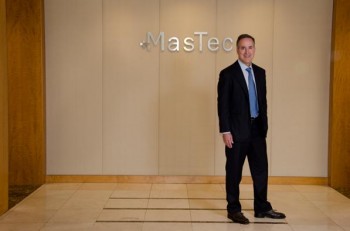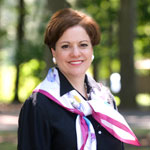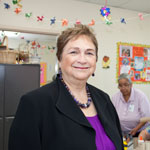Jorge Mas inherited more than just the multibillion-dollar company MasTec from his late father—he inherited a legacy of leading by example
For most people going to work on February 14, 1997, it was a normal morning. But for Jorge Mas, that morning marked one of the most important moments of his career. It was 9:29 a.m., and he was standing next to his father, Jorge Mas Canosa, at the New York Stock Exchange, overlooking the trading floor teeming with anxious day traders and stock hounds, sipping coffee and whispering tips. And when the clock turned to 9:30, Mas and his father struck the opening bell, officially opening the morning’s markets and announcing the first day their company, MasTec, went public. Within the space of a year, MasTec (traded as MTZ) was the first Hispanic-owned company to hit the $1 billion revenue mark, and with a current $3.6 billion revenue and workforce of more than 13,000, it’s also consistently rated one of the top five largest Hispanic-owned firms in the United States.
“From the day I started with the company, I wanted to take it public, and on that February morning, I was able to ring the opening bell with my late father,” Mas says. “It was a very meaningful moment for me.” In addition to now serving as the chairman of MasTec, Mas is also the chairman of the board for the Cuban American National Foundation (CANF), with both positions propelling Mas to leadership roles not only within the business community, but the greater social community.
“My parents taught me that it’s extremely important to give back to your community, and more importantly, to leave a mark—to leave your whole legacy,” Mas says. “I have always tried to conduct my life with this mantra in mind—that we need to make a difference and we need to leave a legacy.”

Mas isn’t far from the mark in citing his parents as the source of this ethos, and you could say that he’s a living example of what it means to “leave a legacy.” Any conversation about the Mas family eventually leads back to Mas’s father, who was responsible for founding both MasTec and the CANF. When he passed away in November 1997, at the age of 58, he left behind an expansive legacy.
Even from a young age, Mas looked to his father as an example and a role model. As an example of this, and Mas’s own cultivated interest in the vitality of his family, he cites an early decision he made about his college education. He had applied to various colleges, and got accepted to both Dartmouth and the University of Miami (UM). Mas’s parents were Cuban exiles and Mas himself had grown up in Florida. Mas chose UM, largely due to its proximity to the family business, but also because of how this would help his father.
“I had always aspired to be engaged and involved in the family business,” Mas explains. “My late-father’s passion was fighting for a free Cuba. He had started a business more out of necessity, so I looked at my ability to engage in the family business both as an opportunity to allow my father to engage his passion and while I could also help elevate the family business.”
Mas graduated in 1984, and topped it off with an MBA in 1985. MasTec was then operating as Church & Tower, a telephonic infrastructure company originally formed in Cuba and then incorporated in Miami in 1968, with Mas Canosa claiming half ownership and taking over company management in 1969. By 1971, with a borrowed $50,000, Mas Canosa purchased the remaining shares of the company.
By the early 1990s, with efforts spearheaded by Mas, the Church & Tower Group acquired 65 percent of the outstanding stock of Burnup & Sims, Inc., then a publicly traded company, effectively merging the two companies. The event that put Church & Tower in a position for such a large merger, Mas says, was Hurricane Andrew. “In the year following the hurricane, when all of the infrastructure had to be rebuilt, our company tripled in size and capacity,” Mas says. “I saw how we were able to still succeed by delivering service to our customers during difficult times, so I also started looking at our largest competitor [Burnup & Sims], gave their chairman a cold call, and started the conversation.” In 1994, after eight months of discussion, the companies were united under one new brand—MasTec—with Mas Canosa serving as chairman and Mas serving as CEO. Combined, the companies shared roughly $60 million in revenue.
In 1997, even with MasTec’s going public as a cornerstone for Mas, his father, and their family, Mas Canosa passed away that November—a low contrast to the high point of ringing the opening bell just a few months prior. “This led to a significant amount of reflection on my part,” Mas says. “It forced me to evaluate where we go from here, but it also allowed me to engage and get involved a year later with CANF.”
By being active not only at MasTec, but stepping into leadership at CANF, Mas took on his father’s legacy, but also began to set a precedent of his own, bearing both a business and a social responsibility. Mas’s father helped established CANF in 1981 to promote a “free and democratic Cuba.” Presently, 70 percent of America’s 856,000 Cuban Americans live in Florida, reflecting the continued importance of the organization and Mas’s own echoes of his father’s original mission.
Mas has served as the chairman of CANF since 1999, and transitioned from CEO to chairman of MasTec in 1997, with his younger brother, Jose, currently serving as CEO. “Leadership is not always a bed of roses. A lot of times, it means taking new positions, leading new paths, and doing those things out of conviction,” Mas reflects. “This is why I believe in leading by example. If people don’t understand what you’re doing or why you’re doing it, you cannot lead.”
Check out all of Hispanic Executive‘s 2013 Top 10 Líderes here.

